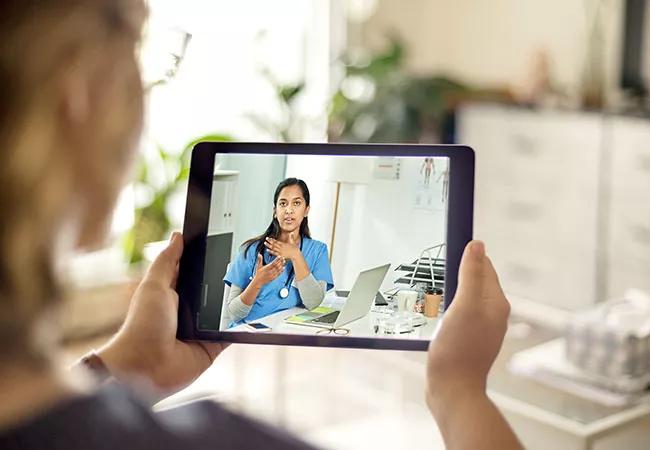Post-NICU discharge visits are convenient and effective

Image content: This image is available to view online.
View image online (https://assets.clevelandclinic.org/transform/1fbf09c1-6b90-4082-9835-9e94a7c5c935/650x450-Virtual-Visit_jpg)
650×450-Virtual-Visit
As a neonatologist, Ajith Mathew, MD, is in a unique position when it comes to establishing meaningful relationships with patients and their families. “We are the first people parents see when their infant is sick,” he says. “This really bonds providers and families.”
Advertisement
Cleveland Clinic is a non-profit academic medical center. Advertising on our site helps support our mission. We do not endorse non-Cleveland Clinic products or services. Policy
Because of this, Dr. Mathew’s focus is not only the patient. “We take care of the patient, but we also take care of the whole family. I see not only the baby and parents, but the grandparents, aunts and uncles. We get to know the extended family. We see them through good days and days when it’s not so positive.”
With the help of Cleveland Clinic Express Care Online, Dr. Mathew is taking that family relationship outside the Neonatal Intensive Care Unit (NICU) through virtual visits. In the summer of 2018, he and colleague Anirudha Das, MD, began conducting post-NICU discharge virtual visits with patients from Cleveland Clinic Fairview Hospital as a way to engage families after they left the NICU. Plans are to expand the visits to main campus and Cleveland Clinic Hillcrest Hospital next.
“So far, we’ve seen more than 200 patients,” states Dr. Mathew. “The show-up rate is around 70%, and the feedback has been really positive. We find that we’re answering more general questions — about sleep and eating. We’re giving parents an opportunity to ask any questions they have. We’re there to give them reassurance that everything is OK and that they’re doing a great job as parents.”
Telemedicine, according to Dr. Mathew, will play a significant role in reaching Cleveland Clinic’s institutional goal of doubling the number of patients it serves. “Virtual health is really about convenience for patients and access. If you can access the internet or have access to a phone, you have access to healthcare anywhere in the world,” Dr. Mathew notes.
Advertisement
“From the patient side, one of biggest benefits of virtual visits is convenience — especially for our families, who have a young infant. You can have an appointment from the comfort of your home. For families with other siblings at home, especially those under the age of five, to pack all of them up and bring them to an office is a lot of work,” Dr. Mathew continues.
“As a provider, there are benefits, too. I see the parents and the baby, but because they’re at home, I also see the environment the family is in. We get a sense of the home life. We can see where the baby sleeps. We can give tips if something doesn’t seem right. You can also see any stressors for the parents. Do they have other kids? Is one parent the primary caregiver? You get to see things you don’t see when they come to you in an office.”
Be a part of the largest independent patient experience event in the world. Join us for the Patient Experience: Empathy + Innovation Summit May 18-20, 2020, in Cleveland, Ohio.
Advertisement
Advertisement
Findings hold lessons for future pandemics
One pediatric urologist’s quest to improve the status quo
Overcoming barriers to implementing clinical trials
Interim results of RUBY study also indicate improved physical function and quality of life
Innovative hardware and AI algorithms aim to detect cardiovascular decline sooner
The benefits of this emerging surgical technology
Integrated care model reduces length of stay, improves outpatient pain management
A closer look at the impact on procedures and patient outcomes